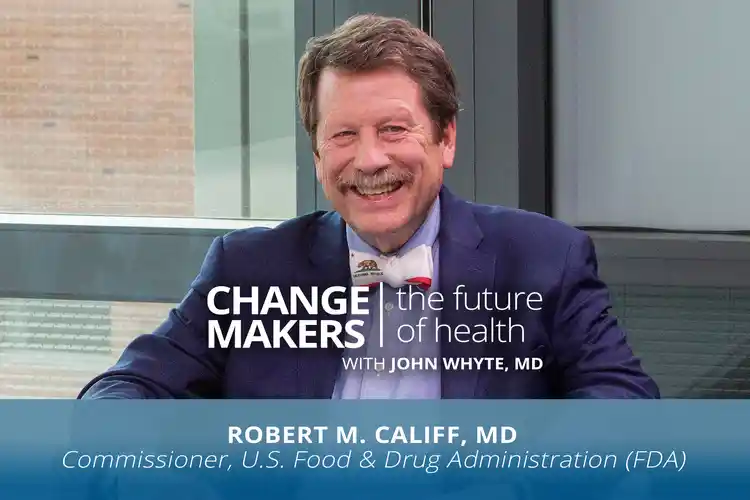
[ad_1]

Might 31, 2023 – In an unique sit-down interview with WebMD’s John Whyte, MD, FDA Commissioner Robert M. Califf, MD, stocks how synthetic intelligence may just develop into the way forward for medication, what the FDA can and can’t do about drug shortages and incorrect information, and why it’s an exhilarating time on the company.
“Let’s speak about what everybody’s speaking about: synthetic intelligence, virtual gear, ChatGPT,” mentioned Whyte, WebMD’s leader clinical officer.
AI’s possible is dependent upon the way it’s used, Califf mentioned. “It might be used for super achieve or it might be used for super hurt.”
Califf is “very excited” concerning the upside. AI might result in new illness therapies or to find knowledge related to a specific affected person from wisdom bases “which can be simply very exhausting for us” as people to get right of entry to and believe.
Getting too interested by AI’s possible advantages isn’t a excellent factor both as a result of “you would possibly not see the drawback,” mentioned Califf. He’s conversant in the generation as a former chief of well being technique and coverage for Verily, a subsidiary of Alphabet, Google’s guardian corporate.
Mitigating Incorrect information
Any other truth in 2023 is a few fashionable well being and clinical incorrect information. Califf has known as this “a number one explanation for preventable loss of life.”
The FDA is studying extra about how incorrect information works and why it spreads briefly across the web. The company additionally desires to seek out answers, “however I haven’t discovered someone who believes they have got the suitable solution,” Califf mentioned.
Within the period in-between, reacting briefly when incorrect information begins circulating is essential, he mentioned, as is restoring religion in our key establishments as resources of dependable knowledge.
Addressing Drug Shortages
Whyte requested Califf about drugs shortages, the use of Adderall for instance.
Many of us take into accounts the pharmaceutical business as something, Califf mentioned, however it’s truly two. There’s an innovator business that develops new medication and a generic drug business that accounts for approximately 90% of prescriptions. The income made by means of the innovator business get a large number of consideration, he mentioned, whilst the loss of benefit as an incentive for generic producers does now not.
“This has brought about a large drawback. A lot of generic medication are in scarcity at any given time as a result of there may be now not sufficient benefit.”
Adderall is a unique case as a result of this is a managed substance and the quantity to be had for prescription is managed by means of the Drug Enforcement Management. There has additionally been a “super building up in prescribing” on account of digital prescribing, Califf mentioned.
Occasional high quality problems that pause production additionally reason shortages of many drugs.
“We would like that lets repair most of these issues,” Califf mentioned. “However we do not make the drugs and we will’t inform anyone they will have to make medications.”
Enthusiasm on the Helm
Regardless of those demanding situations, Califf stays constructive. “It is simply wonderful to peer the development in science and medication.”
“I am maximum interested by the danger to modify public well being,” he mentioned. The FDA is only one participant that should collaborate with the CDC, the Nationwide Institutes of Well being, the Facilities for Medicare and Medicaid Products and services, and the personal sector. “It is truly essential. We were given to make it paintings higher.”
Even supposing making adjustments will contain a large number of paintings, Califf mentioned, “It is an exhilarating time.”
See the overall interview with Califf on Medscape right here.
Extra Knowledge From WebMD
Synthetic Intelligence (AI) in Well being Care
[ad_2]